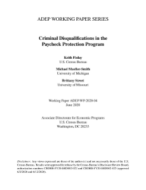
An official website of the United States government
Here’s how you know
Official websites use .gov
A .gov website belongs to an official government organization in the United States.
Secure .gov websites use HTTPS
A lock (
) or https:// means you’ve safely connected to the .gov website. Share sensitive information only on official, secure websites.
-
//
- Census.gov /
- Library /
- Census Working Papers /
- Criminal Disqualifications in the Paycheck Protection Program
Criminal Disqualifications in the Paycheck Protection Program
Criminal Disqualifications in the Paycheck Protection Program
Abstract
In response to the COVID-19 pandemic, Congress created the Paycheck Protection Program (PPP)
to support small businesses. Small businesses can secure loans through the PPP from the Small
Business Administration (SBA) for payroll, rent, mortgage interest, or utilities, which can be forgiven if firms maintain stable employee counts and wages. Businesses are ineligible for the PPP
if an owner has a recent criminal history record. Based on individual tax return data linked at the
person level to data from seven states from the Criminal Justice Administrative Records System
(CJARS), as many as 3.2 percent of sole proprietorships may be ineligible for the Paycheck Protection Program (PPP) due to current or prior criminal justice involvement. Black and Hispanic men with sole proprietorship income are more likely to be PPP-ineligible than White men. Between 6.9 and 15.4 percent of former convicts rely on self-employment income, which is particularly pronounced for women. Ineligibility rates would at least triple if exclusion criteria were expanded to include older convictions and less serious crimes.
Others in Series
Working Paper
Working Paper
Working Paper
Share
Some content on this site is available in several different electronic formats. Some of the files may require a plug-in or additional software to view.
 Yes
Yes
 No
NoComments or suggestions?


Top

